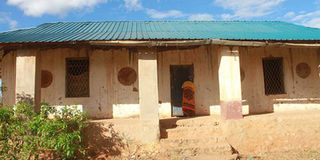Johannes Hofmann: co-founder of AIC Ikutha

This image taken on May 21, 2019 shows the Africa Inland Church at Ikutha, Kitui County. Johannes Hofmann helped found the church. PHOTO | PIUS MAUNDU | NATION MEDIA GROUP
What you need to know:
- It was in Kitui where the Holy Bible was first translated from European languages and published in several indigenous dialects.
From the outside, nothing betrays the rich history confined within the Africa Inland Church at Ikutha, Kitui County.
In terms of architectural design, the church looks like thousands of others across the country. But unknown to many, it is perhaps the oldest and first ever AIC parish to be established in Kenya.
The giant AIC, with a strong following of more than 12 million faithful across East Africa, traces its origins in the dusty Ikutha Township in Kitui South constituency where it was founded by European missionaries in the late 19th century.
In the church compound, a graveyard of seven German missionaries, including their lead cleric Johannes Hofmann, reveals the significance Ikutha played in spreading the Gospel in Kenya.
The houses Hofmann helped build more than 120 years ago still stand on the church compound, a constant reminder of his great work.
CHURCH ORIGIN
Hofmann, who had been sent by the Evangelical Lutheran Mission of Leipzig in South West Germany, founded the giant AIC in Kenya from the remote township.
He died of malaria mid-1914 alongside his wife, four children and a white househelp — and they’re buried in the compound of the church they helped build.
According to Bishop Silas Yego, the current head of the church, it was in Kitui where the Holy Bible was first translated from European languages and published in several indigenous dialects, including Kikamba.
“The church, the largest Protestant group in Kenya whose growing adherence is drawn across all the country’s 47 counties, traces its origin in Kitui,” the bishop says.
The now busy Mombasa-Nairobi highway, then a dull, bushy pathway, was fully established as a trade route during his time as locals sustained links with the Arabs through barter trade.
TEA
Besides, local pastors say, he introduced the taking of tea as a breakfast beverage, a practice that took root to become an almost sacrosanct culture among the church ranks and beyond.
Before the missionaries’ arrival at Ikutha, the local community knew nothing about tea, only taking porridge or milk.
Speaking sign language through an interpreter, Hofmann lived a normal life in Ukambani where local elders donated land to the Ikutha church.
“He used to ride a mule and spoke a language people thought was godly. He was a white man and because of his skin colour, local people thought he was a god,” reads part of the memoirs kept by the parish.
Ikutha AIC parish has raised money towards a project whose aim is to preserve the founder missionaries’ graveyard, the houses they lived in and the maiden AIC church building they built towards the close of the 18th century.
“Part of the money would go towards the restoration, beautification and preservation of Hofmann’s burial site,” Pastor Joel said.





